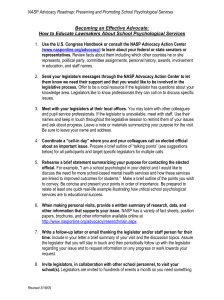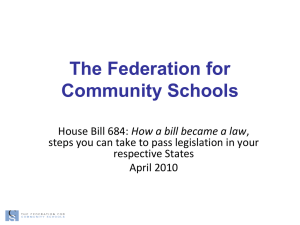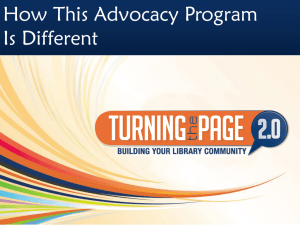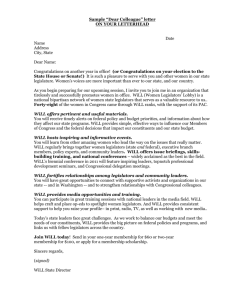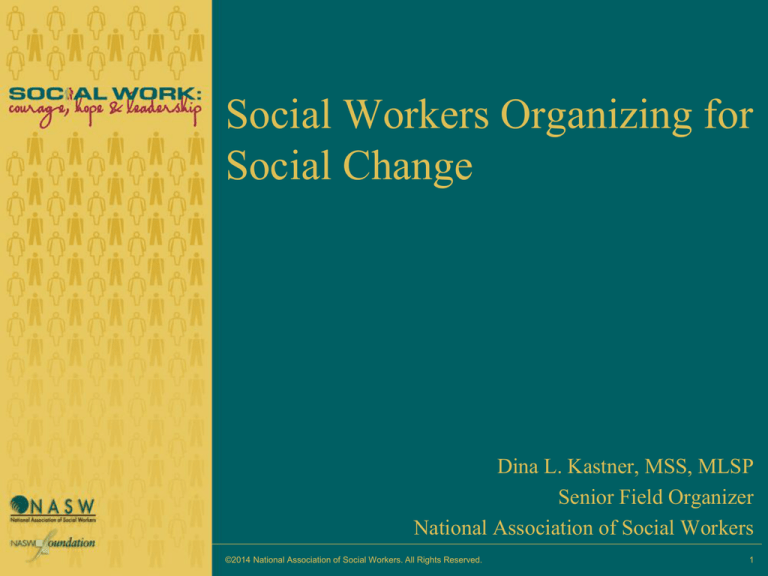
Social Workers Organizing for
Social Change
Dina L. Kastner, MSS, MLSP
Senior Field Organizer
National Association of Social Workers
©2014 National Association of Social Workers. All Rights Reserved.
1
Agenda
•
•
•
•
Organizing Roots
Determining an Issue
Developing a Strategy
Implementing Tactics
©2014 National Association of Social Workers. All Rights Reserved.
2
Social Work’s Organizing Roots
• Settlement House Movement
Saw need for both individual change and
societal change
Engaged clients in social change
• History of Social Work parallels the
history of community organizing
Response to the paradoxical history of
American Society (i.e., espousing freedom
while only land-owning men were allowed to
vote for much of our history)
Kahn, S. (1991). Organizing: A guide for grassroots leaders (rev. ed.).Washington, DC: National
Association of Social Workers.
©2014 National Association of Social Workers. All Rights Reserved.
3
Ethical Grounding
• Fulfilling the Code of Ethics
6.04 Social and Political Action
(a) Social workers should engage in social and
political action that seeks to ensure that all
people have equal access to the resources,
employment, services, and opportunities they
require to meet their basic human needs and to
develop fully. Social workers should be aware
of the impact of the political arena on practice
and should advocate for changes in policy and
legislation to improve social conditions in order
to meet basic human needs and promote social
justice.
National Association of Social Workers. (2008). Code of ethics of the National Association of Social
Workers. Washington, DC: NASW Press.
©2014 National Association of Social Workers. All Rights Reserved.
4
Determining An Issue
•
•
•
•
•
•
Knowledge of the community
Issues raised by clients
Mission of the organization
Piece of legislation
Key event in the community
Research
Surveys
Focus groups
Community meetings
Bobo, K., Kendall, J., & Max, S. (2001). Organizing for social change (rev. ed.). Santa Ana, CA:
Seven Locks Press.
©2014 National Association of Social Workers. All Rights Reserved.
5
Developing a Strategy
• Involve members of your
community/organization during strategy
development
• Considerations
Goals of the campaign/organization
Resources of your organization
Resources of allied organizations
Resources of opponent’s organizations
Primary and Secondary Targets
©2014 National Association of Social Workers. All Rights Reserved.
6
Defining Targets
• Who can make the change you seek?
Primary target: Name of a specific legislator,
council member
Secondary target: Name of person who can
influence the legislator you are targeting (i.e.
County Commissioner; head of large social
service agency in the district)
©2014 National Association of Social Workers. All Rights Reserved.
7
Choosing Tactics
• Legislative Advocacy
Working to influence legislation
• Administrative Advocacy
Working to influence policy implementation
• Political Advocacy
Working to influence federal, state, or local
elections
©2014 National Association of Social Workers. All Rights Reserved.
8
Legislative Advocacy
• Working with Congress, the state legislature, or
local councils to influence policy
Signing on to petitions or letters to
legislators
Coordinating campaigns to write letters,
faxes, e-mails to legislators
Attending Town Hall Meetings (organizing
individuals to ask specific questions or keep
track of proceedings)
In-person meetings with legislators
Inviting legislators to your agency or
community event
Proposing language for legislation
©2014 National Association of Social Workers. All Rights Reserved.
9
Do Legislators Listen?
• Yes, first to their own constituents
• In-person contact is best, but volume of
calls, faxes, and e-mails work too
• Personal stories can be more effective
than statistics, but both are needed
• Legislative bodies are generally the most
responsive to constituents since they run
for office
©2014 National Association of Social Workers. All Rights Reserved.
10
Administrative Advocacy
• Working with local, state, or federal
agencies to influence policy
implementation
Attend hearings/rule making
sessions
Provide written comments to
agency
Document issues encountered by
clients/members and share with
administrators
©2014 National Association of Social Workers. All Rights Reserved.
11
Electoral Advocacy
• Working to influence federal, state, or local
elections
Endorse candidates for federal office
Contribute to candidates, attend fundraisers
or other community events by candidates
Register clients or members to vote
Provide information about volunteering for
local campaigns
Drive clients/members to polling locations
Educate clients/members about election
issues
Encourage and train others to run for elective
office
©2014 National Association of Social Workers. All Rights Reserved.
12
Contact Me
Dina L. Kastner
Senior Field Organizer
National Association of Social Workers
202.336.8218
dkastner@naswdc.org
©2014 National Association of Social Workers. All Rights Reserved.
13





